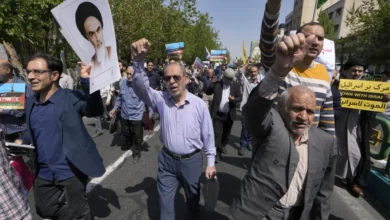
Laila Soueif, a long-time Egyptian activist in her 50s and assistant professor at Cairo University, chuckles softly and humbly at the suggestion of being interviewed as a hunger striker for a piece prompted by the mass hunger strikes by Palestinian prisoners in Israel jails.
“What I did was nothing compared to the Palestinians,” she says. Her action was taken out of prison. Nevertheless, she agrees to talk about her thoughts on and the experience of hunger striking for 22 days in response to her son and fellow activist, Alaa Abd El Fattah, being imprisoned and tried by a military court last year.
In a region still battling post-colonial dictatorships and militarized judicial systems, hunger striking as a tool of resistance has found currency, not for the first time, among prisoners fighting for their rights.
Their actions have put the spotlight on the conditions of their imprisonment and the justice systems that put them there in the first place: Israel’s collective punishment of those it deems “security prisoners” and its widely condemned practice of administrative detention, Bahrain’s military trials of pro-democracy activists, and Egypt’s similar military trials for civilians.
The reason we’re hearing a lot more about it “may have something to do with the bigger spotlight on the Middle East, but also with the way hunger strikes seem to be used by various people (in Bahrain, Syria, Israel/Palestine) simultaneously,” Laleh Khalili, senior lecturer in Middle East politics at the School of Oriental and African Studies, University of London, says.
For Soueif, hunger-striking is “an act of extreme hope.” “You’re not killing anyone. If you’re hurting anybody, it’s your own self and you’re willing it to do it to death, because you think that there are enough good people in the world to stand by you.”
“You do that and believe that people will not let you down. Even if their reaction is delayed, even if it goes on until you die, you firmly believe that it will count very heavily against your oppressor,” she says.
There are around 2,000 Palestinian prisoners on an open-ended hunger strike in Israeli jails, according to the latest estimate by the Palestinian NGO Prisoner Support and Human Rights Association (also known as Al-Dameer, which means conscience in Arabic).
They are demanding an end to administrative detention, isolation and other punitive measures taken against them, including the denial of family visits and access to university education.
Ahmad Sa’adat, the imprisoned Secretary General of the Popular Front for the Liberation of Palestine, who has been held in isolation for over three years, reported on 23 April that since the beginning of his hunger strike on 17 April, he has lost 6 kg.
For their act of defiance, Palestinians are being punished by the Israel Prisons Service (IPS), in whose facilities they are being held. These include attacks on prisoners’ sections, confiscation of personal belongings, transfers from one prison to another, placement in solitary confinement, fines, and denial of family and lawyer visits.
The IPS has also confiscated the hunger-strikers’ only source of nourishment: salt for their water.
“This is completely criminal,” says Soueif, who sustained herself with two rehydration salt packets a day, water and un-sugared tea. “The doctors explained to me that you do irreparable damage within a couple of weeks, if you’re on a hunger-strike and don’t take the salts. This is what your body really misses.”
Israel stepped up its action against Palestinian “security prisoners,” which the Israeli Supreme Court gave IPS the right to define, as a form of collective punishment in the lead-up to the release of imprisoned Israeli soldier Gilad Shalit in June 2011, according to the Arab Centre for Minority Rights in Israel (Adalah). Despite Shalit’s release, the conditions of Palestinian prisoners have not improved.
Out of a total of 19,561 prisoners in IPS facilities, 4,631 are security prisoners, of which 14 are Jewish and the rest Palestinian, according to Adalah, which based its figures on February 2012 IPS statistics.
Additionally, around 320 Palestinians from the Occupied Palestinian Territories (East Jerusalem, the West Bank and Gaza) are being held in administrative detention in Israel without charge or trial, a practice widely condemned by Israeli and international human rights organizations.
Khader Adnan went on a hunger strike for 66 days between December and February last year in protest of his administrative detention, prompting comparisons with the hunger strikes lead by Irish Republican Bobby Sands in 1981. Sands died in the prison hospital on the 66th day.
Sands’ death and that of ten other men in 1981 proved to be a defining moment in the struggle between the Provisional Irish Republican Army and the British government, under then Prime Minister Margaret Thatcher. It boosted the ranks of the IRA and radicalized nationalist politics, argued Roy Greenslade, professor of journalism at City University, in the Guardian in June 2011.
Adnan, a baker in Ramallah with a Master’s degree, however survived his hunger strike and was released after severe public pressure and condemnation of Israel over the lack of evidence for his imprisonment. He was accused by Israel of being a leader in the Palestinian Islamic Jihad group, which it considers a terrorist organization. Adnan denied this.
While Adnan and another high profile hunger striker Hana Shalabi managed to secure their release, many others remain in detention.
While international law permits the use of administrative detention as a means of last resort, “Israel’s use of administrative detention blatantly violates these restrictions,” according to the Israeli human rights organization B’Tselem.
“Over the years, Israel has administratively detained thousands of Palestinian for prolonged periods of time, without prosecuting them, without informing them of the charges against them, and without allowing them or their attorneys to study the evidence,” it says.
Israel’s Administrative Detention Laws were adopted wholesale from a predecessor colonial law enacted by the British during the Arab Revolt in 1937, according to “Policing and Prison in the Middle East: Formations of Coercion,” a book co-edited by Khalili.
Since Israel captured the West Bank and Gaza Strip in 1967, over 750,000 Palestinians have been through the Israeli detention system, Al-Dameer says. And Palestinian prisoners have for decades used hunger-striking as a form of protest.
In Bahrain, leading opposition activist Abdulhadi al-Khawaja went on a hunger strike until the end of April before being drugged and force-fed by prison authorities, according to his wife Khadija al-Mousawi. The prison hospital denies this.
He is one of 20 other men imprisoned by a military court on charges of leading an uprising in the island kingdom last year in the wake of the Arab Spring against the monarchical rule of the Khalifa family. He was sentenced to life in prison last June and has been tortured in detention, he says.
On 30 April, an appeals court ordered the retrial of Khawaja’s case along with the other activists in a civil court. But he will remain in custody pending the retrial, much to the disappointment of his supporters.
Mousawi told the BBC she supported her husband’s decision to go on a hunger-strike even at risk to his own life. “He can’t live in a cage. I support his decision fully. If you know the judicial system in Bahrain you will know it is the same judges in the military court and in the civilian court, but with different clothes. Nothing will change. The judges are from Khalifa or some Egyptians who are being paid by the government,” she said.
The military trial of civilians in Bahrain echoes similarities to Egypt. Maikel Nabil, a 26-year-old blogger, was sentenced by a military court to two years in prison in December for insulting the military and was fined LE200. He was released at the end of January after ten months in jail, half which he spent on a diet of milk and water.
Hunger striking has a long history in Egypt and dates back to the end of the 19th century when Egypt took responsibility to feed inmates, according to historian Anthony Gorman writing in “Policing and Prisons.” One of the first hunger strikes of a political figure occurred when Muhammad Kamil Husayn, a trade unionist, reportedly refused food in early 1922.
Hunger striking won inmates rights, but also resulted in deaths. “Nevertheless, the hunger strike remained an effective way of protesting prison conditions, particularly when publicized,” Gorman writes.
This is exactly why Soueif took up her action. “I needed something that would put daily pressure on the authorities. There was already a whole media campaign for Alaa, but the authorities tend to think, ‘We can let this guy go, but next week.’ They don’t have a sense of time, so a hunger strike gives a sense of urgency; it makes absolutely every day count,” she said.
Soueif knew that the media buzz around the story of a “mother on hunger strike” would take the campaign to whole new level. And it worked.
For her what was important was not just securing her son’s release, who was let go after two months, but also focusing media attention on the issue of military trials.
“The important thing was bringing new people into the issue. A lot of the people who called me or wrote to me were people who had not been there before and who didn’t know about the problem of military tribunals. They didn’t know the gory details of men receiving five-year prison sentences in 48 hours flat with no real legal representation. The hunger strike was a chance to talk about all this and put it in mainstream media coverage,” she adds.
Khalili agrees that hunger-striking remains a powerful tool for revolutionaries.
“Of course, weaponizing one’s body is the last resort of the powerless, but it has always been a very powerful weapon of revolutionaries — and people like Bobby Sands of Northern Ireland will be very familiar names in the Middle East too.”




